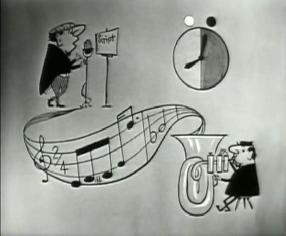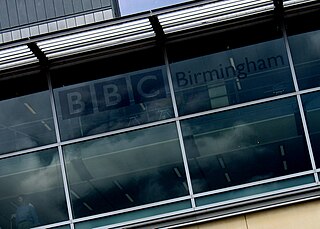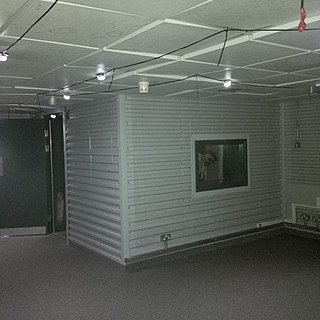Related Research Articles

Radio drama is a dramatized, purely acoustic performance. With no visual component, radio drama depends on dialogue, music and sound effects to help the listener imagine the characters and story: "It is auditory in the physical dimension but equally powerful as a visual force in the psychological dimension." Radio drama includes plays specifically written for radio, docudrama, dramatized works of fiction, as well as plays originally written for the theatre, including musical theatre, and opera.

BBC Radio 4 is a British national radio station owned and operated by the BBC. The station replaced the BBC Home Service on 30 September 1967 and broadcasts a wide variety of spoken-word programmes from the BBC's headquarters at Broadcasting House, London. Since 2019, the station controller has been Mohit Bakaya. He replaced Gwyneth Williams, who had been the station controller since 2010.

BBC One is a British free-to-air public broadcast television channel owned and operated by the BBC. It is the corporation's oldest and flagship channel, and is known for broadcasting mainstream programming, which includes BBC News television bulletins, primetime drama and entertainment, and live BBC Sport events.

Hancock's Half Hour was a BBC radio comedy, and later television comedy series, broadcast from 1954 to 1961 and written by Ray Galton and Alan Simpson. The series starred Tony Hancock, with Sidney James; the radio version also co-starred, at various times, Moira Lister, Andrée Melly, Hattie Jacques, Bill Kerr and Kenneth Williams. The final television series, renamed simply Hancock, starred Hancock alone.
A miniseries or mini-series is a television show or series that tells a story in a predetermined, limited number of episodes. Many miniseries can also be referred to, and shown, as a television film. "Limited series" is a more recent US term which is sometimes used interchangeably. As of 2021, the popularity of miniseries format has increased in both streaming services and broadcast television.

BBC Birmingham is one of the oldest regional arms of the BBC, located in Birmingham. It was the first region outside London to start broadcasting both the corporation's radio and television transmissions, the latter from the Sutton Coldfield television transmitter.

Simon Andrew Hicks Mayo is an English radio presenter and author who worked for BBC Radio from 1982 until 2022.

Doctor Who Confidential is a documentary series created by the British Broadcasting Corporation (BBC) to complement the revival of the long-running British science fiction television series Doctor Who. Each episode was broadcast on BBC Three on Saturdays, immediately after the broadcast of the weekly television episode on BBC One. The first and second series episodes ran 30 minutes each; third series instalments ran 45 minutes. BBC Three also broadcast a cut-down edition of the programme, lasting 15 minutes, shown after the repeats on Sundays and Fridays and after the weekday evening repeats of earlier seasons. Confidential received its own version of the Doctor Who theme tune, at least three different versions of the theme appeared in the series.
The Chris Moyles Show is the title given to two differing versions of a radio programme hosted by Chris Moyles, originally broadcast as Radio 1 Breakfast from 5 January 2004 to 14 September 2012, before transferring three years later on 21 September 2015 to the Global Radio-owned commercial radio station Radio X. The show is broadcast between 6:30 and 10:00 each weekday.
Torchwood is a British science fiction television programme created by Russell T Davies. A spin-off of the 2005 revival of Doctor Who, it aired from 2006 to 2011. The show shifted its broadcast channel each series to reflect its growing audience, moving from BBC Three to BBC Two to BBC One, and acquiring American financing in its fourth series when it became a co-production of BBC One and Starz. Torchwood is aimed at adults and older teenagers, in contrast to Doctor Who's target audience of both adults and children. As well as science fiction, the show explores a number of themes, including existentialism, LGBTQ+ sexuality, and human corruptibility.

Life on Mars is a British television series broadcast on BBC One between 9 January 2006 and 10 April 2007. It follows Sam Tyler, a Manchester policeman in 2006 who wakes up after a car accident to discover that he has time-travelled to 1973, where he works the same job in the same location under the command of Detective Chief Inspector Gene Hunt while attempting to solve the mystery of what has happened to him.

Lewis is a British television detective drama produced for ITV, first airing in 2006 (pilot) then 2007. It is a spin-off from Inspector Morse and, like that series, it is set in Oxford. Kevin Whately reprises his character Robert "Robbie" Lewis, who was Morse's sergeant in the original series. Lewis has now been promoted to detective inspector and is assisted by DS James Hathaway, portrayed by Laurence Fox, who was promoted to inspector before the eighth series. The series also stars Clare Holman as forensic pathologist Dr. Laura Hobson, likewise reprising her role from Inspector Morse; and, from the eighth season, Angela Griffin as DS Lizzie Maddox.
Amelia Mary Bullmore is an English actress, screenwriter and playwright. She is known for her roles in Coronation Street, I'm Alan Partridge (2002), Ashes to Ashes (2008–2009), Twenty Twelve (2011–2012) and Scott & Bailey (2011–2014). Bullmore began writing in 1994. Her writing credits include episodes of This Life, Attachments, Black Cab, and Scott & Bailey.

The Bill is a British police procedural television series, first broadcast on ITV from 16 October 1984 until 31 August 2010. The programme originated from a one-off drama, Woodentop, broadcast in August 1983.

A television show, TV program, or simply a TV show, is the general reference to any content produced for viewing on a television set that is traditionally broadcast via over-the-air, satellite, or cable. This includes content made by television broadcasters and content made for broadcasting by film production companies. It excludes breaking news, advertisements, or trailers that are typically placed between shows. Television shows are most often scheduled for broadcast well ahead of time and appear on electronic guides or other TV listings, but streaming services often make them available for viewing anytime. The content in a television show is produced by one of two production methodologies: live taped shows such as variety and news magazine shows shot on a television studio stage or sporting events The other production model includes animation and a variety of film productions ranging from movies to series. Shows not produced on a television studio stage are usually contracted or licensed to be made by appropriate production companies.

The Wartime Broadcasting Service is a service of the BBC that is intended to broadcast in the United Kingdom either after a nuclear attack or if conventional bombing destroyed regular BBC facilities in a conventional war. It is unclear if the Wartime Broadcasting Service is still operational as plans are kept mainly secretly with the BBC and government officials. According to an article by the BBC, recordings of a nuclear attack warning are still re-recorded and kept up to date periodically.

The letters of last resort are four identically worded handwritten letters from the prime minister of the United Kingdom to the commanding officers of the four British ballistic missile submarines. They contain orders on what action to take if an enemy nuclear strike has both destroyed the British government and has also killed or otherwise incapacitated both the prime minister and their designated "second person" of responsibility, typically a high-ranking member of the Cabinet such as the deputy prime minister or the first secretary of state. If the orders are carried out, the action taken could be the last official act of His Majesty's Government.

Simon Mayo Drivetime, is the incarnation of the drivetime show on BBC Radio 2 between 11 January 2010 and 4 May 2018, being revived briefly for Mayo's final show with the station on 21 December that year, and then fully from 15 March 2021 on Greatest Hits Radio. It is broadcast on weekdays from 16:00 to 19:00 in the United Kingdom. It is presented by broadcaster Simon Mayo, who originally moved to BBC Radio 2's drivetime from his weekday afternoon show on BBC Radio 5 Live after Chris Evans moved to take over the Radio 2 Breakfast Show.

DCI Banks is a British television crime drama series produced by Left Bank Pictures for the ITV network. Originally broadcast over five series in 2010–2016, the series was based on Peter Robinson's Inspector Alan Banks novels and stars Stephen Tompkinson as Detective Chief Inspector Alan Banks. In 2013, the series won in the drama category at the regional Royal Television Society Yorkshire Programme Awards.
RTÉ One is an Irish free-to-air flagship television channel owned and operated by RTÉ. It is the most-popular and most-watched television channel in the country and was launched as Telefís Éireann on 31 December 1961, it was renamed RTÉ in 1966, and it was renamed as RTÉ 1 upon the launch of RTÉ 2 in 1978. It is funded partly by the government's licence fee; the remainder of the funding is provided by commercial advertising. Because RTÉ is funded partly by the licence fee it shows considerably fewer advertisements than most other channels available in Ireland and Northern Ireland.
References
- ↑ "A name change for dramas on Radio 4". BBC Radio 4 blog. 31 January 2012.
- ↑ "Lost radio plays". Radio Plays & Radio Drama. Retrieved 24 August 2022.
- ↑ Image Dissectors (2009). "The State of the Afternoon Play". ImageDissectors.com. Retrieved 9 February 2010.
- ↑ Simon Elmes, And Now on Radio 4 (London: Arrow Books, 2008), 210
- ↑ Hellen, Nicholas (11 July 1999). "Julie Andrews to sing to Brits during nuclear attack". Sunday Times.
- ↑ Scott Matthewman "A play by any other name Archived 1 May 2012 at the Wayback Machine ", The Stage, 13 February 2012
- ↑ Image Dissectors (2009). "A Brief Guide to Radio Drama". ImageDissectors.com. Retrieved 9 February 2010.